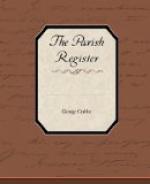Thus both, as prudence counsell’d,
wisely stay’d,
And cheerful then the calls of Love obeyed:
What if, when Rachel gave her hand, ’twas one
Embrown’d by Winter’s ice and Summer’s sun ?
What if, in Reuben’s hair the female eye
Usurping grey among the black could spy?
What if, in both, life’s bloomy flush was lost,
And their full autumn felt the mellowing frost?
Yet time, who blow’d the rose of youth away,
Had left the vigorous stem without decay;
Like those tall elms in Farmer Frankford’s ground,
They’ll grow no more,—but all their growth is sound;
By time confirm’d and rooted in the land,
The storms they’ve stood, still promise they shall stand.
These are the happier pairs, their life has rest,
Their hopes are strong, their humble portion blest.
While those more rash to hasty marriage led,
Lament th’ impatience which now stints their bread:
When such their union, years their cares increase,
Their love grows colder, and their pleasures cease;
In health just fed, in sickness just relieved;
By hardships harass’d and by children grieved;
In petty quarrels and in peevish strife
The once fond couple waste the spring of life;
But when to age mature those children grown,
Find hopes and homes and hardships of their own,
The harass’d couple feel their lingering woes
Receding slowly till they find repose.
Complaints and murmurs then are laid aside,
(By reason these subdued, and those by pride;)
And, taught by care, the patient man and wife
Agree to share the bitter-sweet of life;
(Life that has sorrow much and sorrow’s cure,
Where they who most enjoy shall much endure:)
Their rest, their labours, duties, sufferings, prayers,
Compose the soul, and fit it for its cares;
Their graves before them and their griefs behind,
Have each a med’cine for the rustic mind;
Nor has he care to whom his wealth shall go,
Or who shall labour with his spade and hoe;
But as he lends the strength that yet remains,
And some dead neighbour on his bier sustains,
(One with whom oft he whirl’d the bounding flail,
Toss’d the broad coit, or took the inspiring ale,)
“For me,” (he meditates,) “shall soon be done
This friendly duty, when my race be run;
’Twas first in trouble as in error pass’d,
Dark clouds and stormy cares whole years o’ercast,
But calm my setting day, and sunshine smiles at last:
My vices punish’d and my follies spent,
Not loth to die, but yet to-live content,
I rest:”—then casting on the grave his eye,
His friend compels a tear, and his own griefs a sigh.
Last on my list appears a match of love,
And one of virtue;—happy may it prove! —
Sir Edward Archer is an amorous knight,
And maidens chaste and lovely shun his sight;
His bailiff’s daughter suited much his taste,
For Fanny Price was lovely and was chaste;
To her the Knight with gentle looks drew near,
And cheerful then the calls of Love obeyed:
What if, when Rachel gave her hand, ’twas one
Embrown’d by Winter’s ice and Summer’s sun ?
What if, in Reuben’s hair the female eye
Usurping grey among the black could spy?
What if, in both, life’s bloomy flush was lost,
And their full autumn felt the mellowing frost?
Yet time, who blow’d the rose of youth away,
Had left the vigorous stem without decay;
Like those tall elms in Farmer Frankford’s ground,
They’ll grow no more,—but all their growth is sound;
By time confirm’d and rooted in the land,
The storms they’ve stood, still promise they shall stand.
These are the happier pairs, their life has rest,
Their hopes are strong, their humble portion blest.
While those more rash to hasty marriage led,
Lament th’ impatience which now stints their bread:
When such their union, years their cares increase,
Their love grows colder, and their pleasures cease;
In health just fed, in sickness just relieved;
By hardships harass’d and by children grieved;
In petty quarrels and in peevish strife
The once fond couple waste the spring of life;
But when to age mature those children grown,
Find hopes and homes and hardships of their own,
The harass’d couple feel their lingering woes
Receding slowly till they find repose.
Complaints and murmurs then are laid aside,
(By reason these subdued, and those by pride;)
And, taught by care, the patient man and wife
Agree to share the bitter-sweet of life;
(Life that has sorrow much and sorrow’s cure,
Where they who most enjoy shall much endure:)
Their rest, their labours, duties, sufferings, prayers,
Compose the soul, and fit it for its cares;
Their graves before them and their griefs behind,
Have each a med’cine for the rustic mind;
Nor has he care to whom his wealth shall go,
Or who shall labour with his spade and hoe;
But as he lends the strength that yet remains,
And some dead neighbour on his bier sustains,
(One with whom oft he whirl’d the bounding flail,
Toss’d the broad coit, or took the inspiring ale,)
“For me,” (he meditates,) “shall soon be done
This friendly duty, when my race be run;
’Twas first in trouble as in error pass’d,
Dark clouds and stormy cares whole years o’ercast,
But calm my setting day, and sunshine smiles at last:
My vices punish’d and my follies spent,
Not loth to die, but yet to-live content,
I rest:”—then casting on the grave his eye,
His friend compels a tear, and his own griefs a sigh.
Last on my list appears a match of love,
And one of virtue;—happy may it prove! —
Sir Edward Archer is an amorous knight,
And maidens chaste and lovely shun his sight;
His bailiff’s daughter suited much his taste,
For Fanny Price was lovely and was chaste;
To her the Knight with gentle looks drew near,




